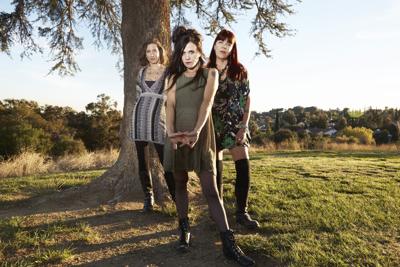Kat Bjelland turns off the bathwater at her home in Minnesota. After touring with a reunited Babes In Toyland for the first time in nearly 20 years, the singer and guitarist has some time off before a second leg.
"Oh my gosh, I feel like since this last tour, honest, it's been the best tour since we first started," says Bjelland, whose raw, wide-mouthed howls shrink to a soft raspy speaking voice. From the late 1980s through the mid-'90s, Bjelland's snarling vocals, jangly guitar discord and wide-eyed sneering under a mop of shocked blonde hair (now jet black) steered Babes In Toyland's anarchic, dissonant punk rock, inspiring bands like Bikini Kill and Sleater-Kinney. Or so says Tom Morello, who introduced the band at a show in Los Angeles earlier this year. Bjelland is humble and a bit overwhelmed by the praise — her band is among the first under the "riot grrrl" umbrella, which she says "wasn't anything negative, it was all positive, but it got a little redundant."
Bjelland grew up outside Portland, Oregon, listening to surf music and radio rock (Rush, Aerosmith, Iron Maiden), and in the early '80s drove 30 minutes into "the big city" to see bands like The Wipers. "I felt like the world opened up," she says. "I didn't know about punk rock that much. I was from a small town. All of a sudden I was like, 'What the f— is this?'"
She moved to Minneapolis several years later ("with $35, a backpack and my stupid acoustic guitar") and met longtime Babes In Toyland drummer Lori Barbero. With the band's first bassist Michelle Leone, Babes In Toyland released its debut Spanking Machine on the Minneapolis punk and alternative label Twin/Tone, followed by the band's major label debut, Fontanelle, with bassist Maureen Herman in 1992. Bjelland says she was reluctant to sign with a major label, well before the post-Nirvana deluge of grunge and alt-rock bands flooded rock radio, but the late label rep Tim Carr convinced her.
"I was like, 'I'm not going to change our sound, you f—. F— you! I don't want Bugs Bunny money.' They didn't change a thing," she says.
The band released its final studio album, Nemesisters, in 1995, and then slowly dissolved — Bjelland focused on her band Katastrophy Wife, had a son, Henry, and in 2007 received treatment following a schizophrenic episode. But Bjelland was eager to play again.
"I don't know what happened. Maureen was really adamant — she kept calling me over and over," Bjelland says. "I never answered the phone. I went on hiatus-reclusive big time. I don't know what you'd call it — 'missing,' for 10 years. Then one day she calls and asks, 'Do you want to go to a cabin in Wisconsin?' I said, 'That sounds great.' She came over and got me and she goes, 'Do you want to play again?' ... I answered the phone, that's all I had to do."
The reunion was short-lived — bassist Clara Salyer replaced Herman earlier this year, just six months into the band's 2015 tour. "[Salyer] is pretty something else," Bjelland says. "It adds a new fresh thing. She's so good and humble and sweet. That makes it a different dynamic."
Before the lineup change, the trio — Bjelland, Barbero and Herman — met for its first rehearsal to prepare for a 2015 tour.
"You know how you don't see friends for a long time and then it feels like you saw them the other day?" Bjelland says. "I go '1-2-3-4' and Lori goes, 'I should listen to the song first.' I go, 'Nope, you've got muscle memory. Do it! Go! Go, go, go!' We pretty much played them perfectly from the start. Nearly every word. A couple glitches here and there. ... We were laughing really hard afterwards. I go, 'See, I told ya.'"

